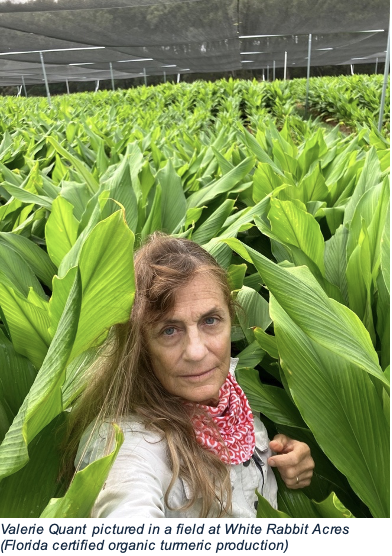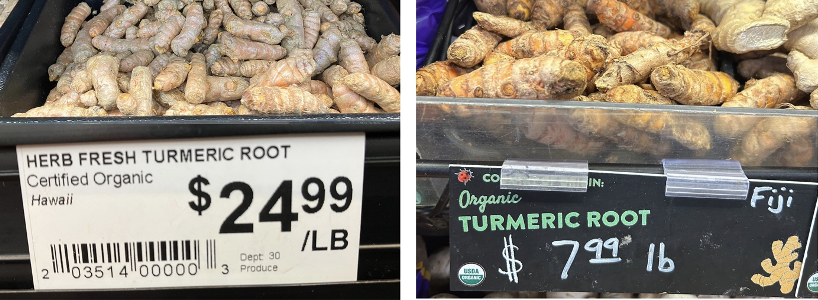Agency betrays its commitment — and the legal requirement — that all organic food come from independently certified and inspected farms
GETTING DOWN TO THE ROOT OF THE STORY:
1. Under federal law, all organic farms must be inspected on an annual basis, as per the congressional mandate in the Organic Foods Production Act of 1990.
2. Without legal authority, the USDA has permitted landholders in developing countries who are producing coffee, nuts, chocolate, tea, herbs, and other specialty crops to be banded together by agribusinesses in “grower/producer” groups with approximately 2% of farmers being subject to the required annual third-party inspections.
3. Some international certifiers, such as France-based EcoCert (an organization that has been in trouble with the USDA and international bodies over the years), certify over 600 groups alone, likely representing many thousands of individual farmers and agribusinesses.
4. It appears that the vast preponderance of these “groups” constitute nothing more than a list of suppliers to a specific processor/marketer — not based on a cooperative or geographic community.
5. The bottom line: Food is being imported at under the cost of production, forcing US growers — who are complying with the law — out of business. Are consumers being defrauded? Likely, but there is virtually no way to know conclusively. [The following story on organic turmeric is a follow-up to an investigation into US hazelnut farmers being quashed by these imports.]
LA FARGE, WIS. — An organic industry watchdog has released a white paper outlining how uninspected organic imports have driven US farmers out of lucrative markets. The results of their findings triggered a formal request to the USDA Office of Inspector General to investigate the apparent systemic failure by the agency’s National Organic Program to enforce federal law.
The issue of foreign agribusinesses inspecting and certifying their own farmer-suppliers, as opposed to abiding by requirements clearly outlined in the Organic Foods Production Act of 1990 (OFPA) requiring all farms to be certified and inspected on an annual basis by independent, USDA-accredited agents, was first brought to the public’s attention by OrganicEye when a federal lawsuit was filed in October 2023.
Research conducted by Wisconsin-based OrganicEye, the country’s preeminent organic governmental and corporate watchdog, documented how hazelnut farmers in the Pacific Northwest are being shut out of the market and dramatically undercut on price, resulting in the lawsuit filed by one of its farmer-members last fall in federal district court.
More recently, farmers in Florida and Hawaii, who were once successfully supplying the domestic wholesale market with turmeric, have contacted OrganicEye’s hotline to report that they too are losing their livelihoods — despite the fact that turmeric, a culinary herbal root, has greatly increased in popularity due to its documented anti-inflammatory and other medicinal qualities.
“When we first commercialized the organic farming movement in earnest, in the 1980s, the foundational marketplace messaging was that all production and advertising claims would be verified for authenticity by independent certifiers. And the operative term is, ‘independent’,” stated Mark Kastel, Executive Director at OrganicEye.
Subsequently, when the US Congress passed OFPA as part of the 1990 farm bill, it adopted the heretofore voluntary certification protocol requiring every farm and manufacturer making organic claims to be overseen by independent third parties that would, going forward, be directly supervised and audited by the USDA.
“Although almost universally complied with in domestic production, that system has completely broken down for imports,” attested Kastel. “A large percentage of all foreign imports, making up a sizable amount of the organic food Americans eat, are coming from ‘producer groups,’ whose grower-members the USDA has exempted from the requirements to be certified.”
Although there is no legal provision for the exemption, decades ago certifiers started allowing cooperatives, small villages, or groups of indigenous peoples, producing high-value, specialty crops, like coffee, chocolate, or spices, to be grouped together in “peer-supervised” producer groups. It was assumed that the small landholders would not be able to afford individual certification and inspections and the exception would both help them access world markets, improving their economic standing, and provide authentic organic food to more affluent Western countries.
OrganicEye claims that system, despite not initially having any legal basis, has been co-opted and applied to crops being produced on commercial-scale farms and including many agricultural commodities and ingredients that have been previously competitively produced in the US.
“Instead of community elders acting as liaisons in the group certification process, we have agribusiness employees conducting up to 98% inspections,” according to Kastel. “The buyers of these commodities have an economic interest and are anything but independent. And they are certainly not an accredited certification agency, as is required by law.”
Brian and Valerie Quant, certified organic turmeric growers in Newberry, Florida have been squeezed out of the wholesale market and are now relegated to marketing direct to consumers, food manufacturers, and small retailers around the country through their website for White Rabbit Acres.

“What grinds my gears is that we, as US farmers and carrying GAP and organic certification, are held to a much higher standard and have annual inspections, associated fees, and extensive required bookkeeping responsibilities,” stated Brian Quant.
And the Quants have taken on quite a bit of risk. They’ve estimated they have $40,000 per acre invested in seed, fertilizer, labor, shade cloth, and irrigation infrastructure.
With a lawsuit pending which, if successful, would compel the USDA to enforce the law, effectively banning group certification, the industry’s major lobby group, the Organic Trade Association (OTA), is threatening to go to Congress, to change the current law to permit the unfair and currently illegal organic importing to continue.
“I’m not sure it’s really all that great a deal for them [the small foreign farmers] as they are sort of ‘bound’ to the corporate entity whose umbrella they are certified under,” Quant added.
The OTA has passionately argued that their motivation to lobby for continuing group certification is their sincere care about small, foreign farmers. However, in research on hazelnuts, turmeric, and other commodities, OrganicEye says it appears that offshore organic producers are receiving little if any premium, and no documentary evidence indicates that participating in organic production has lifted communities out of poverty.

“It’s the height of hypocrisy to cry crocodile tears on behalf of these hard-working, small farmers while OTA agribusiness members rake in billions of dollars and fail to show any compassion for the United States growers who are being squeezed out of business,” OrganicEye’s Kastel said in criticism aimed at OTA lobbyists.
OrganicEye is encouraging organic shoppers to seek out US-grown products, across-the-board, when buying food for their families. They are simultaneously asking all organic stakeholders, farmers, ethical business participants, and eaters, to contact their congressional representatives asking them to be on-guard against stealthy attempts by lobbyists to weaken federal law prohibiting uncertified/uninspected organic imports.
-30-
MORE:
OrganicEye has produced an action alert using software designed to make it easy for constituents to contact their members of Congress and ask them to defend US farmers and the authenticity of the organic food supply.
Bruce Kaser, the OrganicEye farmer-attorney in Oregon who has challenged, in federal court, the USDA’s complacency in allowing group certification that is crushing US hazelnut growers, has this to say about the turmeric investigation:
“In general, it’s a compelling imbalance when you take into account that ‘organic’ is supposed to be produced by farms, yet hardly any certified turmeric farmers exist in the USDA ‘Integrity Database,’ while scads of certified handlers are apparently operating. It’s a huge, inverted pyramid that suggests a totally out-of-whack system.”
During their examination of public records relating to organic turmeric production in Fiji, OrganicEye researchers discovered numerous discrepancies between USDA data posted in the National Organic Program’s Organic Integrity Database and information published on websites maintained by major exporters in the country. Some refer to their production as cultivated, some wildcrafted, and some both, but organic certificates appear to inaccurately reflect the nature of the production. OrganicEye has filed a formal legal complaint against the various certifiers involved, asking the NOP to investigate.
“Since the USDA periodically monitors each certifier, both domestic and internationally based, and is responsible for the accuracy of their database, it is surprising that our researchers are identifying these problems,” said OrganicEye’s Kastel. “We are concerned that these problems may represent a more systemic weakness in the publicly available data supplied by individual, accredited certifiers and maintained by the USDA for the use of the industry.”
What US Tumeric growers have to say:
Stephen Filipiak, Family Farm Inc., Ninole HI
“Ninety-five percent of my sales are direct-store-delivery to retailers I’ve developed long-term relationships with. New prospective retailers push back on my prices; they can buy imported turmeric cheaper.”
Seth Wills, Palm Valley Farm, Hakalau HI
“I was selling 2 pallets a week to a local buyer who was consolidating production from several farms and then selling on to a larger buyer on the mainland. Two years ago, he canceled the agreement, saying he could buy imports from Fiji and Costa Rica for much less.”
“I was abruptly cut off from my island buyer. The first year I was left with $40,000 worth of wasted fertilizer in storage and fallow fields. Last year I concentrated on building a market selling by direct-store-delivery to local retailers. The mainland market is closed to me.”
Howard James, Ginger Ridge Farms, Kurtistown HI
“I bought my farm in 1980 and spent years turning clay into rich healthy soil. For decades, ginger and turmeric were my main crops. Now the market is gone. I lost my ginger market to Peru, then my turmeric market to Fiji. Now I grow vegetables and fruits – and a little turmeric – for the local market: small retailers, restaurants, and direct sales.”
“Ginger and turmeric were my best crops for years, now the market has dried up. I have what is now a market garden growing row crops of vegetables and fruits that I manage with the help of a single employee. And now, after 45 years, I only grow a little turmeric and ginger for local buyers.”
Brian Quant, White Rabbit Farm, Newberry FL
“In the past, I was sold out by April. It’s May and I’m still sitting on thousands of pounds harvested, and a few thousand more in the ground that we’re just not going to bother to dig out this year.”
“I do nothing every day but sit down and Google health food stores, juice bars, and small retailers and try to sell it tomorrow. If it wasn’t for some big internet orders this year, we’d be farther behind.”
“We, as US farmers carrying GAP [Good Agricultural Practices] and Organic Certification, are held to much higher standards, have annual inspections and the fees associated, and do extensive record keeping, etc., to be in compliance. Through group certification, none of these growers or handlers must deal with any of this. I just want us all to have to play by the same rules.”
Get important action items and the latest organic farming and food news delivered right to your inbox.
